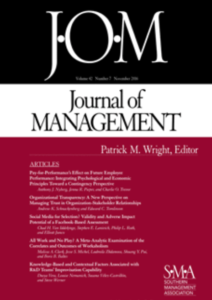Upsides to Dark and Downsides to Bright Personality: A Multidomain Review and Future Research Agenda
-

ABSTRACT It has become common practice to refer to personality traits as being either bright or dark, and a wealth of research has provided support for the effects of both bright traits and dark traits in organizations. This research has largely focused on explaining the downside of dark traits and the upside of bright traits. However, a recent trend has emerged in which scholars are challenging the long-standing convention that bright traits are always beneficial and dark traits are always detrimental. Instead, novel research has begun to explore the potential upside of dark traits and downside of bright traits. In this review, we adopt a multidomain perspective integrating work from organizational behavior, human resources, strategic management, and entrepreneurship—to highlight this growing body of research. Specifically, we focus on the work advancing our understanding of the complexity of personality, such as identifying situations in which dark traits may be advantageous or beneficial and detecting curvilinear effects that suggest too much of a bright trait may be disadvantageous. Furthermore, we provide a brief discussion on special considerations for the measurement of both bright and dark traits and close with a series of avenues for future research.